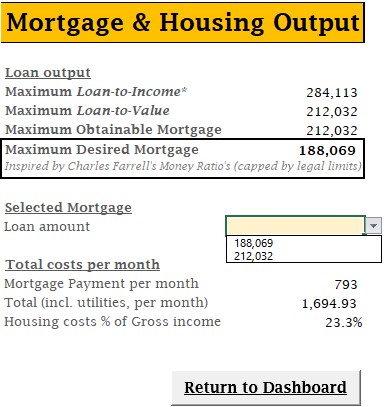This article may contain affiliate links. I will make a small commission if you make a purchase through one of these links, at no extra cost to you. This is how I hope to keep the website up and running for years to come! Please read my disclosure for more info.
When it comes to loans, mortgages tend to be some of the longest running loans someone might get. However, how long should it be? What are the advantages to a 30-year mortgage compared to a 15-year mortgage? What are some of the disadvantages? Should you fix your interest rate for the entire time or take a gamble that they might decrease in a few years? These are some of the mortgage basics we will touch on below.
“Time is more value than money.
You can get more money, but you cannot get more time.”– Jim Rohn
Mortgage basics
This article is part of a series on the basic variables important in a mortgage:
- Loan amount
- Loan term
- Mortgage types
- Fixing the interest rates
- Tax benefits
- Mortgage insurance
- Other obligations (loans, alimony)
I will of course attempt to include as many different financial philosophies along the way, although this is a topic where I cannot avoid regional specificity when it concerns rules and regulations that apply to various parts of this discussion.
Loan term
The most chosen term for a mortgage is perhaps 30 years, and currently, new mortgages in the Netherlands will have a maximum of 30 years. But regardless of that, the main variations on loan term that you will find discussed are the 15- and the 30-year mortgage.
What about this 15- vs. 30-year mortgage? If you’ve followed any of Dave Ramsey’s teachings you would be convinced of a 15-year mortgage – as he is the anti-debt guy, any kind of debt.
In fact, Dave Ramsey recommends buying a house with cash. However, one of the hot topics in the 2020 U.S. presidential election a wealth tax, already exists in the Netherlands, making it reasonably unattractive here to keep saving up until you have the 308,000 needed for an average Dutch home. As it stands currently, that would cost approximately 2,000 to 3,000 in taxes per year, depending on whether or not you have a partner.
Let us have a look at a comparison between the two, putting aside several different considerations and looking at how they compare in each situation – if all else is equal.

Now let’s sum this table up – and look at the case for the 15-year mortgage. The main pros being your debt free sooner and you pay less interest overall. Both of which can be very enticing, just look at the graph below comparing a 15-year mortgage to a 30-year (level-payment) mortgage and you’ll see that the 30-year mortgage takes out an extra 36,015 in interest payments with the higher interest rates and the extra 15 years it takes to pay off. The higher the interest rate, the greater the gap between the two mortgages.
With that being said, the time-value of money is a factor to consider – a concept that needs a separate post to explain properly – but to keep it simple, a mortgage loan starting today will still be using the same numbers in 30 years, however the same currency will be worth less due to various factors including inflation. Spending the same money 15 years earlier is therefore actually more expensive compared to spending it later. In this example, in today’s currency, you are in fact not paying 36,015 extra, but only 3,047 – making Dave Ramsey’s and the likeminded their argument still valid, but a lot less strong.
On the flipside, the main con of the 15-year mortgage is the reduced cash flow which could be invested against (possible) higher returns. This becomes especially relevant with the decreasing interest rates you are finding now, investing the difference between the 710 and the 1,219 per month for 15 years should be able to give you an average return above 1.70%. However, there is a lot of uncertainty there, the market is unpredictable and the main proponent for this argument use historical returns of 7% for the S&P500 – and you should know that past returns can never be a promise for the future. It is even predicted that the next decade is not going to be all great in investment land.
The higher the interest rate, the greater the gap between the two mortgages. When the interest rate is 4 percent, for example, the borrower actually pays almost 2.2 times more interest to borrow the same amount of principal over 30 years compared with a 15-year loan.

Things that I feel should not be a factor in deciding your loan term are the speed of equity building and how much mortgage you can qualify for. First reason is that a home is not an investment, it is where you live and you might never sell this home again – therefore, who cares how much equity you’ve build with it? Robert Kiyosaki even goes as far as calling a house a liability – as it isn’t making you any money. Second reason, I don’t believe you should buy a bigger (or smaller) house just because you can – you should buy the house you need. So taking a 30-year mortgage just to get a bigger house compared to the 15-year mortgage is not a way to go, except of course if you just really cannot afford anything with the lower sum of a 15-year mortgage – which is a reality for many millennials today, even with a 30-year mortgage.
Overall, a 15-year mortgage can bring peace of mind to those wanting security in their mortgage, but it comes with a high opportunity cost and with a risk of not having sufficient cash flow to pay unexpected expenses or to save for other goals such as retirement or education. Lastly, there is the fact that it is not only your decision to make – a lender approves your loan application based on your ability to repay the loan. They compared your monthly income to your monthly debt payments and your debt-to-income ratio might disqualify you for the 15-year mortgage anyway. Alternative there is to take the 30-year loan and to pre-pay your mortgage, which I discuss in a separate post.
Things that I feel should not be a factor in deciding your loan term are the speed of equity building and how much mortgage you can qualify for. First reason is that a home is not an investment, it is where you live and you might never sell this home again – therefore, who cares how much equity you’ve build with it? Robert Kiyosaki even goes as far as calling a house a liability – as it isn’t making you any money. Second reason, I don’t believe you should buy a bigger (or smaller) house just because you can – you should buy the house you need. So taking a 30-year mortgage just to get a bigger house compared to the 15-year mortgage is not a way to go, except of course if you just really cannot afford anything with the lower sum of a 15-year mortgage – which is a reality for many millennials today, even with a 30-year mortgage.
Overall, a 15-year mortgage can bring peace of mind to those wanting security in their mortgage, but it comes with a high opportunity cost and with a risk of not having sufficient cash flow to pay unexpected expenses or to save for other goals such as retirement or education. Lastly, there is the fact that it is not only your decision to make – a lender approves your loan application based on your ability to repay the loan. They compared your monthly income to your monthly debt payments and your debt-to-income ratio might disqualify you for the 15-year mortgage anyway. Alternative there is to take the 30-year loan and to pre-pay your mortgage, which I discuss in a separate post.
I want to hear from you, would you take a 15- or a 30-year mortgage if you have the choice? What would be your main consideration to make this choice?
How useful was this post?
Click on a star to rate it!
Average rating 0 / 5. Vote count: 0
No votes so far! Be the first to rate this post.
We are sorry that this post was not useful for you!
Let us improve this post!
Tell us how we can improve this post?


